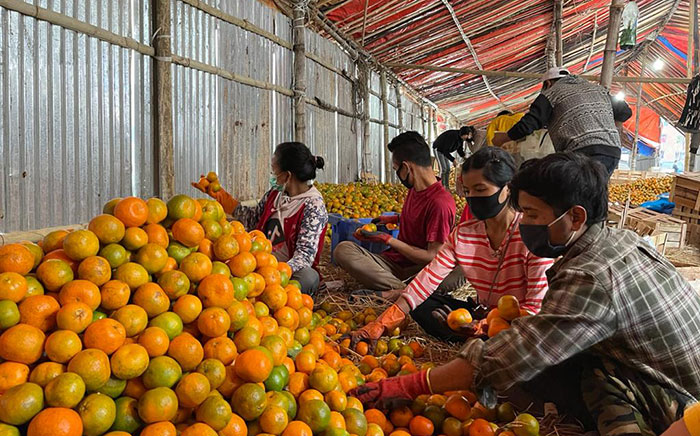Rajesh Rai | Phuentsholing
Notwithstanding the second nationwide lockdown, mandarin orange export in Phuentsholing is going on smoothly.
Several arrangements have been made for this smooth transition.
The Department of Agricultural Marketing and Cooperatives (DAMC) officials and the Incident Management Team, Phuentsholing had come up with arrangements on the evening of December 22 before the town went to a complete lockdown at 2pm yesterday.
The marketing chief with DAMC, Yonten Gyamtsho, said the movement of both inbound and outbound vehicles transporting the export goods is permitted.
“Exporters and their staff are issued with movement permits,” he said. “Workers at the depot are arranged to stay at depot itself and escorts will be provided should there be need for any special movements.”
The proprietor of Druk Phuensum Import and Export (DPIE), Sonam Tobgay, said that having DAMC officials in Phuentsholing was very helpful.
DPIE has been able to export about 27 truckloads of mandarin orange to Bangladesh.
“The production and quality of the orange is unchanged,” he said. “The only problem this year was the labour shortage, due to the pandemic.”
Orange exporters of Phuentsholing and Samtse faced problems while importing wooden packing boxes from India. The customs officials across the border were asking the Indian box exporters to produce the phytosanitary certificate from the National Plant Protection Office.
On December 18, the Indian Embassy Office in Thimphu notified to the foreign affairs ministry that the problem was solved.
An embassy official said: “Authorities concerned in India have informed that the government’s request has been considered favourably and that necessary instructions have been relayed to the customs offices on the Indian side of the border to facilitate export of wooden boxes from India to Bhutan.”
As of today, approximately 300 metric tonnes (MT) of mandarin orange has been exported from Phuentsholing and about 25MT from Samtse.


